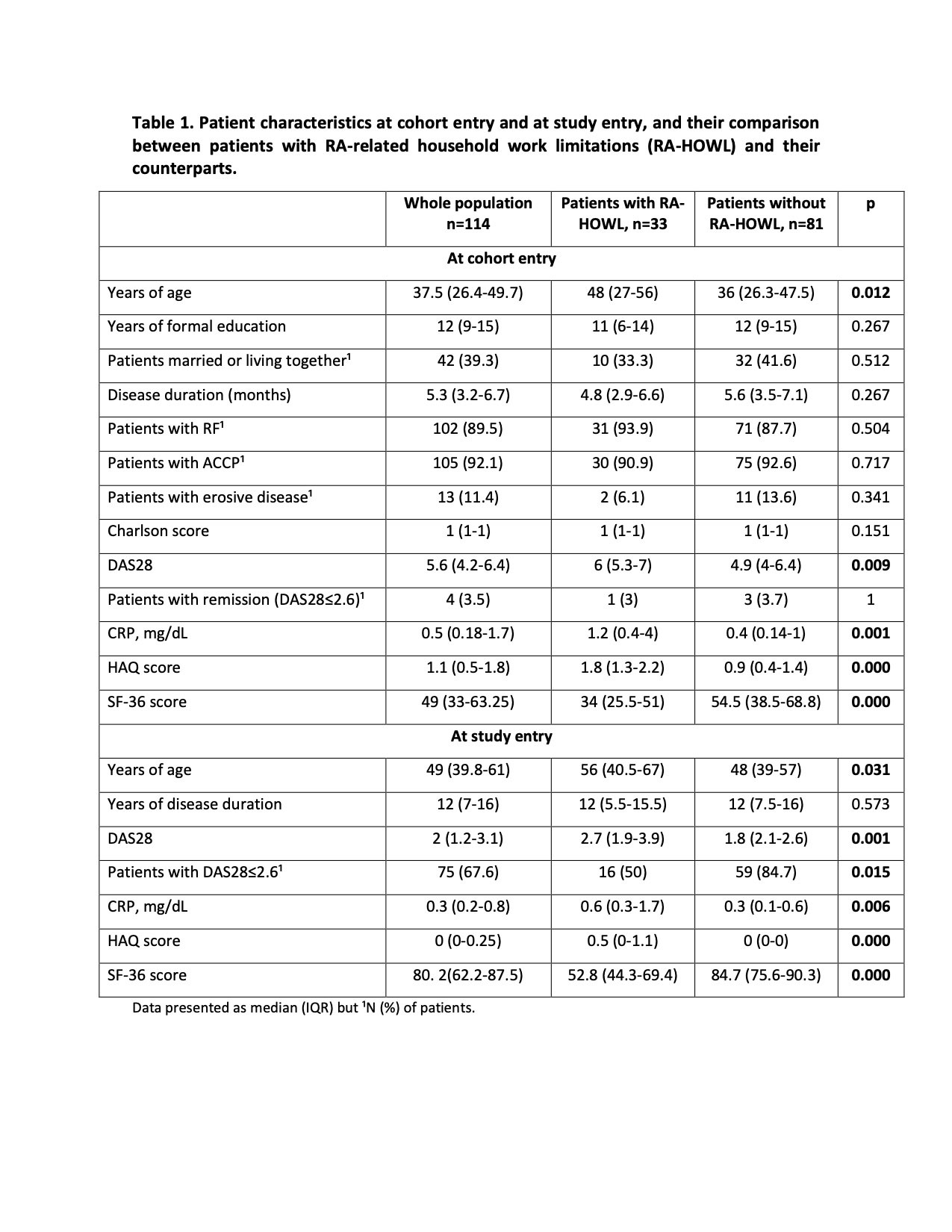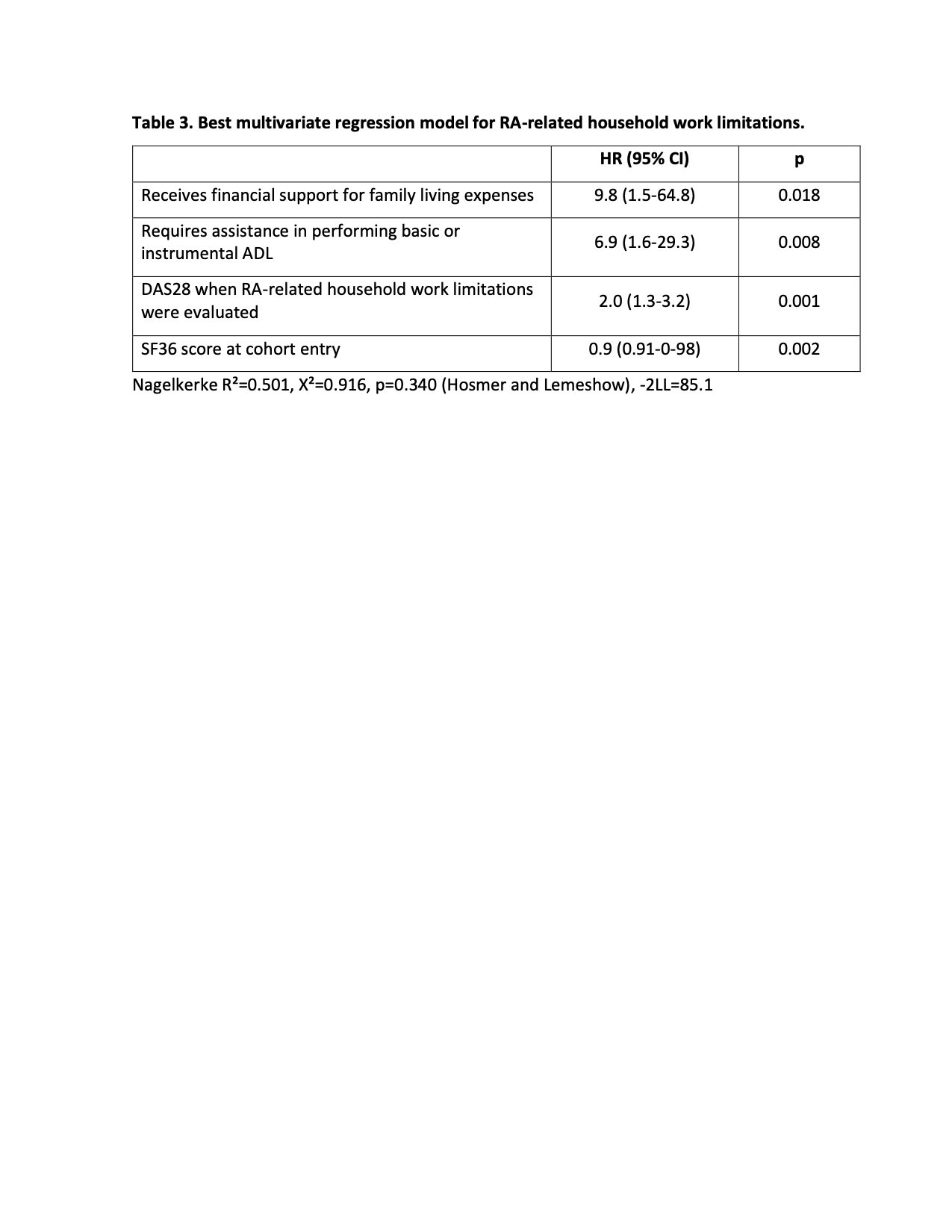Session Information
Session Type: Poster Session B
Session Time: 9:00AM-10:30AM
Background/Purpose: Rheumatoid arthritis (RA) is the most frequent chronic inflammatory arthritis with a clear female preponderance. For various reasons, women spend more time on household work than men, and this figure is extreme in Latin America. We recently developed and validated a questionnaire that assesses the impact of RA on limitations with performing (paid and unpaid) household work, the HOWL-Q¹. The current study aimed to explore factors associated with RA-related household work limitations in female patients from a currently ongoing recent-onset RA cohort.
Methods: In 2004 we initiated an early (≤12 months of symptoms duration) RA cohort. Once enrolled, patients had standardized and extensive rheumatic evaluations (at least joint counts, PROMs, and treatment evaluation, including adherence and comorbidities). In 2020, we incorporated the HOWL-Q into rheumatic evaluations twice a year. Up to April 2022, the cohort had 122 ongoing RA women patients who self-referred (paid and/or unpaid) household work. Among them, 114 (93.4%) completed rheumatic assessments, the HOLW-Q, a questionnaire to assess family responsibilities, household work characteristics, patient’s economic dependency, and the family APGAR index (Adaptation, Partnership, Growth, Affection, and Resolve), which assesses the family function. In addition, charts were reviewed to retrieve baseline characteristics.The possible global HOWL-Q score ranged from 0 to 10. Increasing scores translate into increased household work limitations, and patients who had a score ≥ 3.33 (75th percentile of the data distribution) were considered to have RA-related limitations. Also, patients with APGAR scores≥7 had a normal family function. Multivariate regression analysis estimated HRs (95% CI) to define variables associated with RA-related household work limitations was used.
Results: Overall, when the HOWL-Q was applied, patients had a median (IQR) age of 49 years (39.8-61), disease duration of 12 years (7-16), and 74 patients (67.6%) were in remission (DAS28≤2.6). Their overall HOLW-Q score was 0.67 (0-3.33), and 33 patients (28.9%) had RA-related household work limitations.Tables 1-2 summarize overall population characteristics at cohort entry and when the HOWL-Q was applied (Table 1), and family responsibilities/household work characteristics/patient’s economic dependency and the family APGAR (Table 2). Also, the comparison between RA women with RA-related household work limitation and their counterparts is presented (Tables 1-2).Table 3 presents the best multivariate regression model for RA-related household work limitations.
Conclusion: Receiving financial support for family expenses, requiring assistance for basic and instrumental activities of daily living, and higher disease activity were associated with RA-related household work limitations in patients with substantial follow-up. Meanwhile, a better quality of life at disease onset was protective. The current study makes visible household work and adopts a more comprehensive approach to the impact of RA on women’s life.
To cite this abstract in AMA style:
Ortiz-Haro A, Contreras-Yáñez I, Guaracha Basañez G, Pascual Ramos V. Factors Associated with Household Work Limitations in Mexican Patients with Rheumatoid Arthritis: The Impact of the Disease on Women’s Life [abstract]. Arthritis Rheumatol. 2022; 74 (suppl 9). https://acrabstracts.org/abstract/factors-associated-with-household-work-limitations-in-mexican-patients-with-rheumatoid-arthritis-the-impact-of-the-disease-on-womens-life/. Accessed .« Back to ACR Convergence 2022
ACR Meeting Abstracts - https://acrabstracts.org/abstract/factors-associated-with-household-work-limitations-in-mexican-patients-with-rheumatoid-arthritis-the-impact-of-the-disease-on-womens-life/



